AWM41 1005 - [Nurses Narratives] Sister Kathleen E Maloney
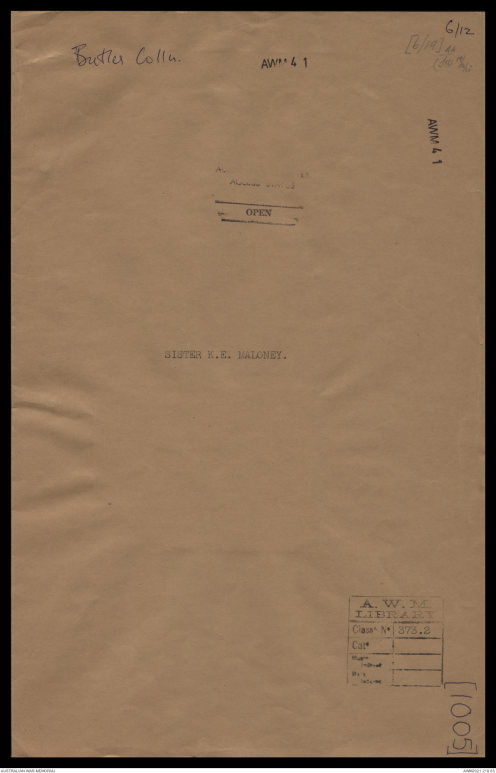
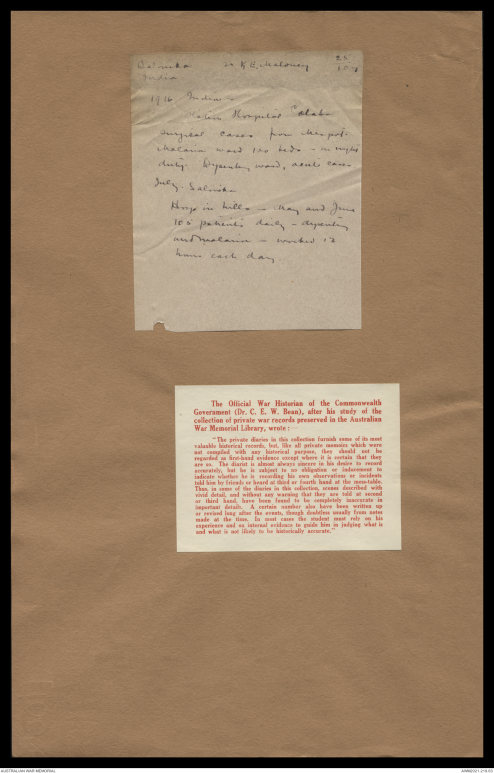
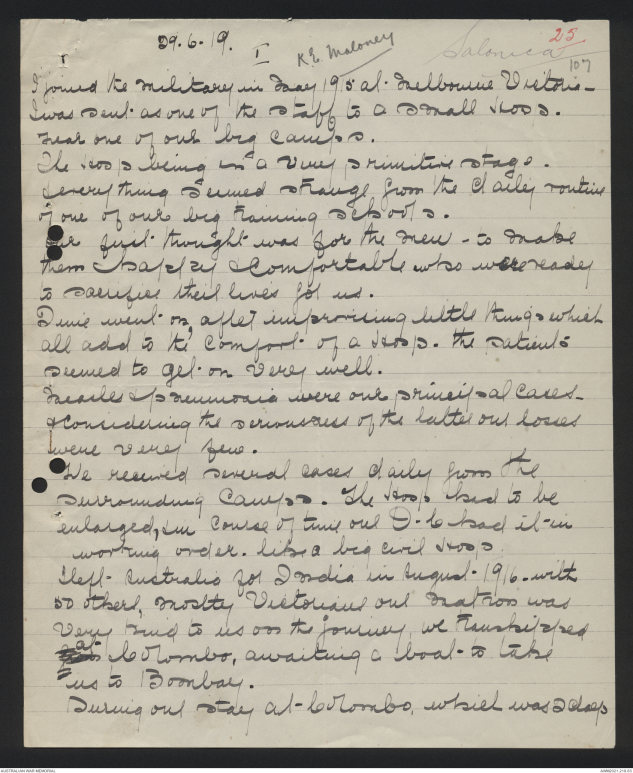
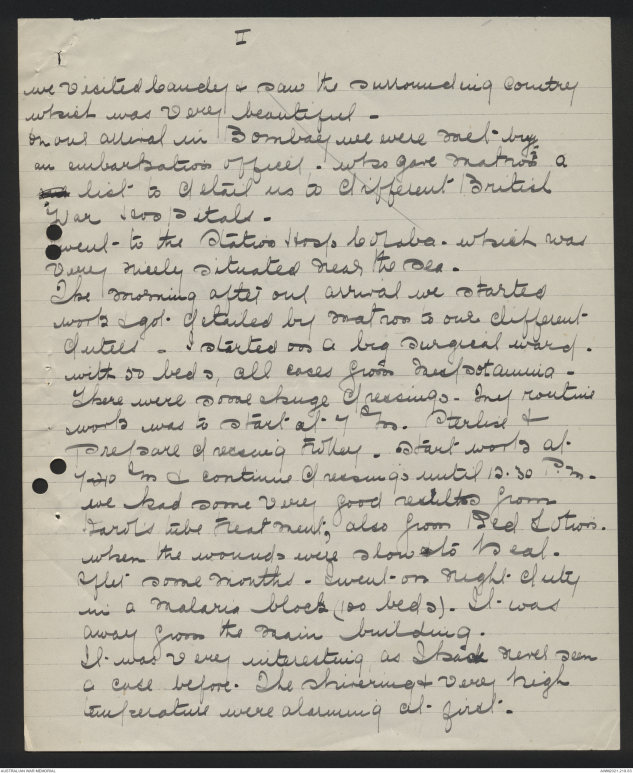
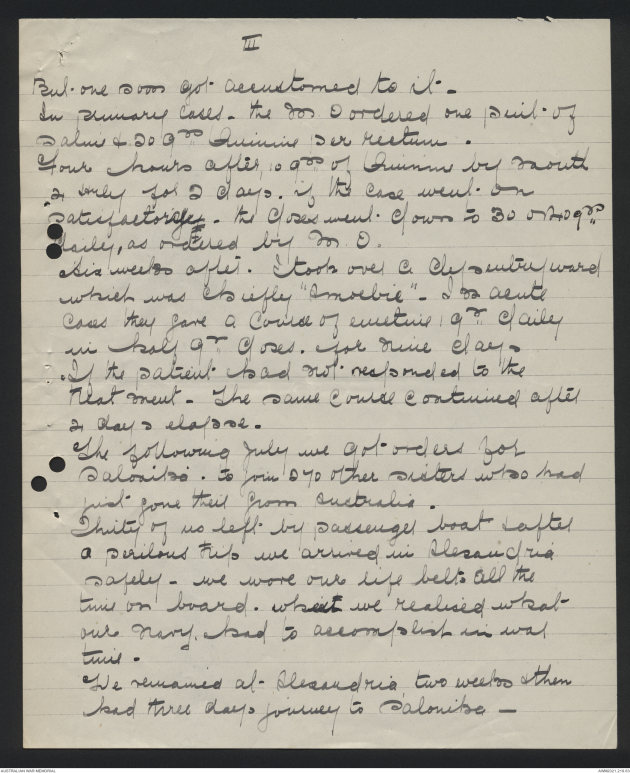
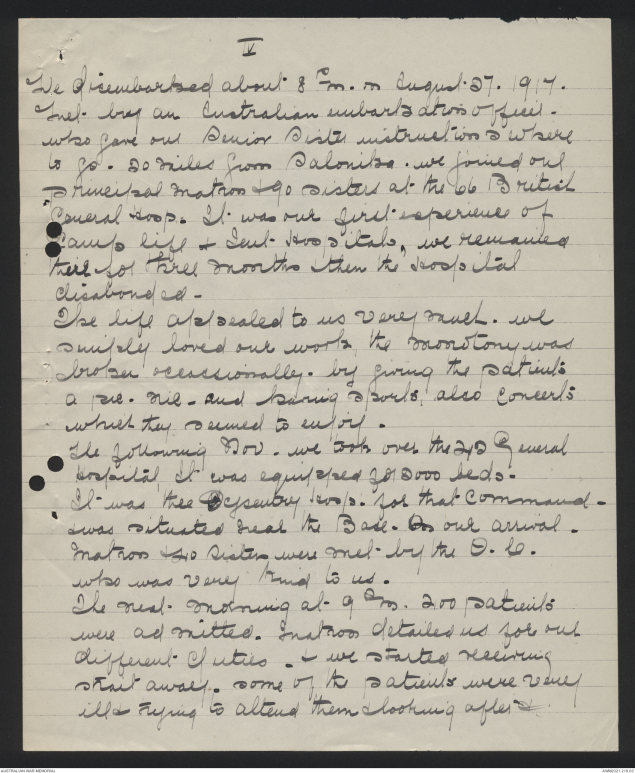
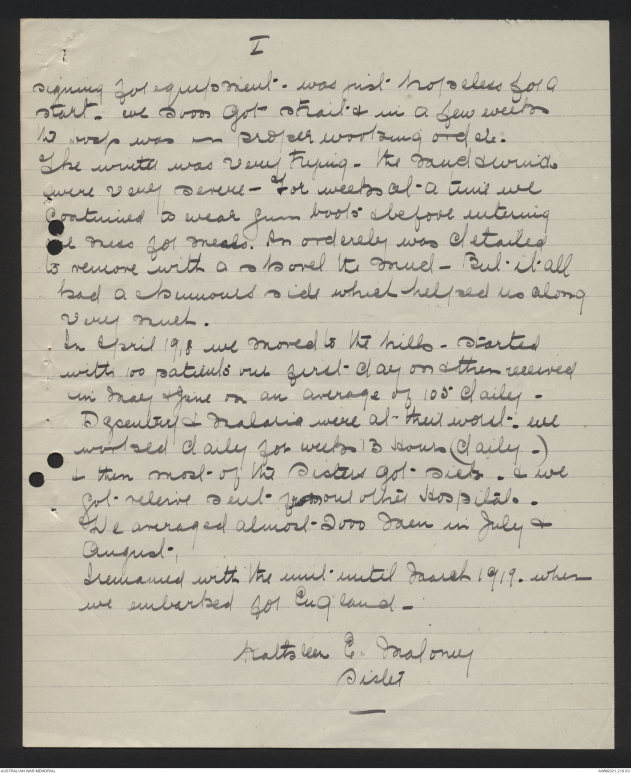
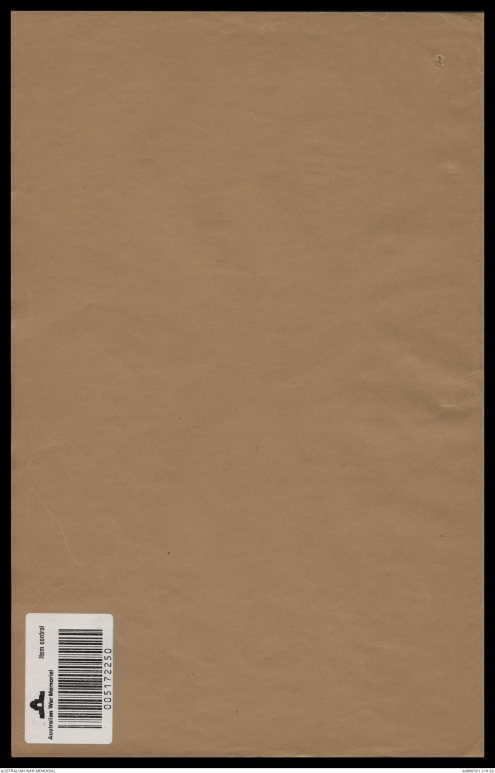
Butler Colln. 6/12
[6/19]
[[?]]
AWM 4 1
OPEN
SISTER K.E. MALONEY.
A.W.M.
LIBRARY
[1005]
[Balmita?] Sr. K.E. Maloney 25/107
1916 India
[?] Hospital [?]
surgical cases for transport
Malaria Ward 100 beds - on night
duty. Dysentery ward, acute cases
July Salonika
[Huge?] in [hills?] - May and June
105 patients daily - dysentery
and Malaria - worked 12
hours each day
29.6.19 25/107
- K.E. Maloney Salonica
I joined the Military in May 1915 at Melbourne Victoria -
I was sent as one of the staff to a small Hosp.
[Fear?] one of our big camps.
The Hosp being in a very primitive stage.
everything seemed strange from the daily routine
as one of our big training schools.
Our first thought was for the men - to make
them as safely & comfortable who were ready
to sacrifice their lives for us.
Time went on after improvising little things which
all add to the comfort of a Hosp. the patients
seemed to get on very well.
Measles & pneumonia were our principal cases -
& considering the seriousness of the latter our losses
were very few.
We received several cases daily from the
surrounding camps. The Hosp had to be
enlarged, in course of time our D. C had it in
working order. like a big civil Hosp.
I left Australia for India in August 1916. with
50 others, mostly Victorians our Matron was
very kind to us on the journey, we [[?]]shipped
xx∧at Colombo, awaiting a boat to take
us to Bombay.
During our stay at Columbo, which was 2 days
II
we visited Caudy & saw the surrounding country
which was very beautiful-
On our arrival in Bombay we were met by
an embarkation officer, who gave Matron a
xxlist to detail us to different British
War Hospitals-
I went to the station Hosp Colaba which was
very nicely situated near the sea.
The morning after our arrival we started
work & got detailed by Matron to our different
duties. I started on a big surgical ward
with 50 beds, all cases from Mesopotamia.
There were some huge dressings. Any routine
works was to start at 7 am. Sterlise &
prepare dressing [[trolley?]]. start work at
7 xx10 am and continue dressing until 12.30p.m.
we had some very good results from
[[?]] tube treatment; also from Bed Lotions.
when the wounds were slowest to heal.
After some months - I went on night duty
in a Malaria block (100 beds). It was
away from the main building.
It was very interesting as I had never seen
a case before. The shivering & very high
temperature were alarming at first.
III
But one soon got accustomed to it.
In primary cases the M O ordered one pint of
saline & 20 gms Quinine per rectum.
Four hours after, 10 gms of Quinine by mouth
& hrly for 2 days. if the case went on
satisfactorily the doses went down to 30 or 40 gms
daily, as ordered by M. O.
Six weeks after. I took over a dysentery ward
which was chiefly "Amoebic" - In acute
cases they gave a course of emetive 9 gms daily
in half 9[?] doses. for nine days
If the patient had not responded to the
treatment - The same course continued after
2 days elapse.
The following July we got orders for
Salonika. to join 270 other sisters who had
just gone their from Australia.
Thirty of us left by passenger boat & after
a perilous trip we arrived in Alexandria
safely - we wore our life belts all the
time on board. which we realised what
our Navy had to accomplish in war
time.
We remained at Alexandria two weeks & then
had three days journey to Salonika.
IV
We disembarked about 8p.m. on August 27. 1917.
Met by an Australian embarkation officer
Who gave out Senior sister instructions & where
to go. 20 miles from Salonika we joined our
principal Matron & 90 sisters at the 66 British
General Hosp. It was our first experience of
camp life - [Tent?] Hospitals, we remained
there for three months then the Hospital
disabanded.
The life appealed to us very much. we
simply loved our work the monotony was
broken occassionally. by giving the patients
a picnic and having sports, also concerts
which they seemed to enjoy.
The following Nov. we took over the [2nd?] General
Hospital, it was equiped for 2000 beds.
It was the Dysentery Hosp for that command.
& was situated near the Base. On our arrival
Matron & 40 sisters were met by the O.C.
who was very kind to us.
The next morning at 9 am. 200 patients
were admitted. Matron detailed us for our
different duties - & we started receiving
strait away. some of the patients were very
ill & trying to attend them & looking after
V
signing for equipment was just hopeless for a
start. we soon got strait & in a few weeks
the hospital was in proper working order.
The winter was very trying - the mud & wind
were very severe - For weeks at a time we
continued to wear gum boots & before entering
[[the?]] mess for meals. An orderly was detailed
to remove with a shovel the mud - But it all
had a humours side which helped us along
very much.
In April 1918 we moved to the hills - started
with 100 patients our first day on & then received
in May & June on an average of 105 daily -
Dysentery & Malaria were at their worst we
worked daily for weeks 13 hours (daily.)
& then most of the sisters got sick & we
got relieve sent from out other Hospitals.
We averaged almost 2000 men in July &
August.
I remained with the unit until March 1919. when
we embarked for England.
Kathleen E. Maloney
Sister
 Sam scott
Sam scottThis transcription item is now locked to you for editing. To release the lock either Save your changes or Cancel.
This lock will be automatically released after 60 minutes of inactivity.